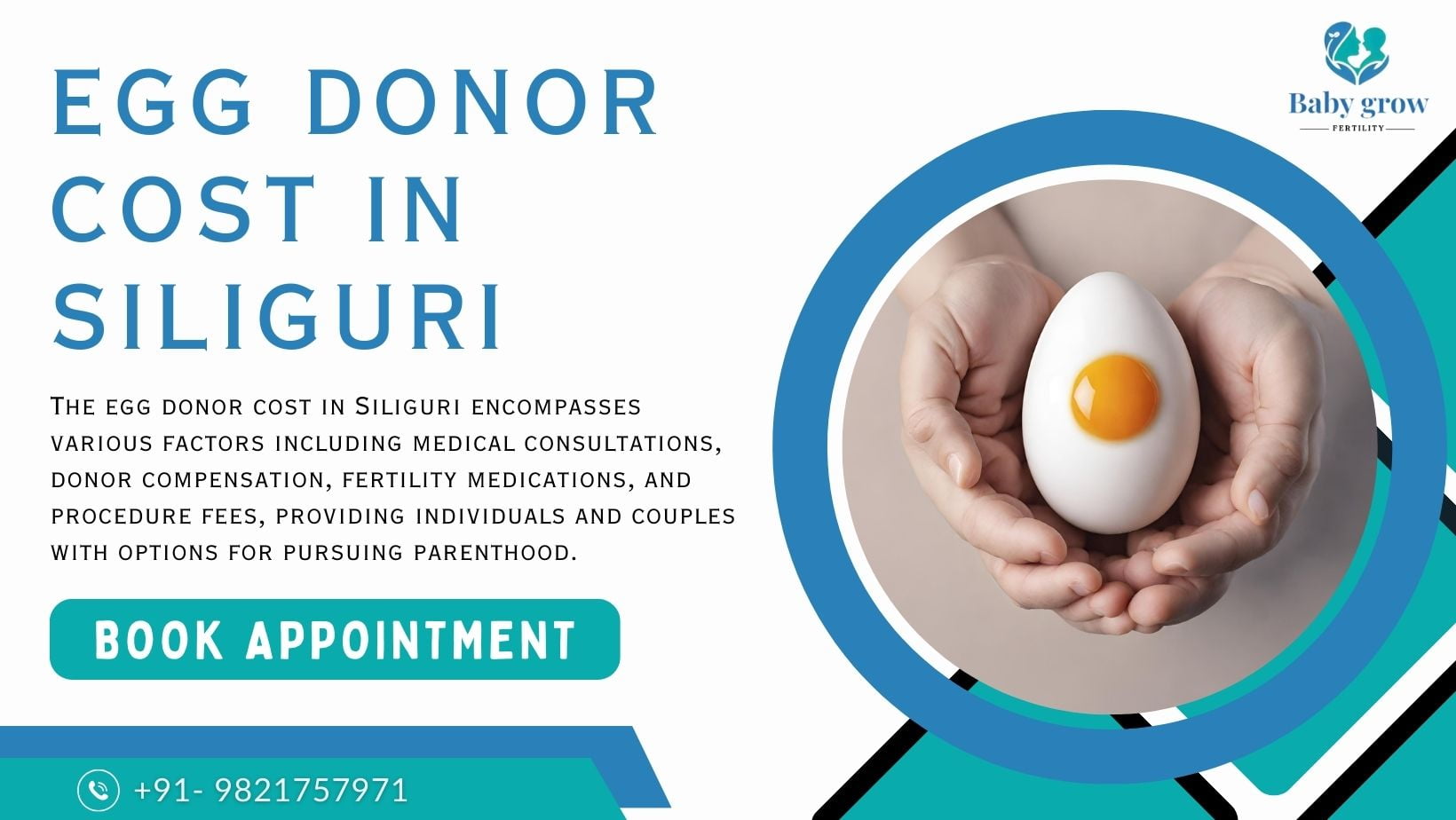Welcome to Baby Grow Fertility, your trusted destination for fertility information and services. Today, we explore the topic of Egg Donor Cost in Siliguri, shedding light on this crucial aspect of third-party reproduction.
Egg donation is a compassionate and generous act that allows individuals or couples struggling with infertility to build their families. In Siliguri, the cost of egg donation can vary depending on several factors, including clinic location, donor screening and compensation, medical procedures, and additional services.
At Baby Grow Fertility, we understand the significance of egg donation in fulfilling the dreams of parenthood. Our comprehensive guide to Egg Donor Cost in Siliguri provides valuable insights into the financial aspects of egg donation, empowering individuals or couples considering this option to make informed decisions. Stay with us as we delve into the intricacies of Egg Donor in Siliguri, guiding you towards your path to parenthood.
What is Egg Donation?
Egg donation is a fertility treatment option where a woman, known as the donor, provides her eggs to be used by another woman, known as the recipient, who is unable to conceive using her own eggs. The process involves the donor undergoing ovarian stimulation to produce multiple eggs, which are then retrieved through a minor surgical procedure. These eggs are fertilized with sperm in the laboratory, and resulting embryos are transferred to the recipient’s uterus. Egg donation offers hope to individuals and couples struggling with infertility, providing them with the opportunity to achieve pregnancy and fulfill their dreams of having a family.
The Egg Donation Process
The egg donation process involves several steps, beginning with the selection of an egg donor and concluding with embryo transfer to the recipient’s uterus. Here’s an overview of the egg donation process:
- Donor Selection: The recipient selects an egg donor from a pool of candidates based on criteria such as physical characteristics, medical history, and educational background.
- Screening and Evaluation: The selected egg donor undergoes a comprehensive screening process, including medical examinations, genetic testing, and psychological assessments, to ensure suitability for donation.
- Synchronization: Once cleared, the donor’s menstrual cycle is synchronized with the recipient’s cycle using hormonal medications.
- Ovarian Stimulation: The donor receives daily injections of fertility medications to stimulate the ovaries and produce multiple eggs.
- Monitoring: Throughout the stimulation cycle, the donor undergoes regular monitoring through ultrasound scans and blood tests to track follicle development and hormone levels.
- Egg Retrieval: Once the follicles reach optimal maturity, the eggs are retrieved from the donor’s ovaries using a minimally invasive surgical procedure performed under sedation.
- Fertilization: The retrieved eggs are fertilized with sperm from the recipient’s partner or a sperm donor in the laboratory, using techniques such as in vitro fertilization (IVF) or intracytoplasmic sperm injection (ICSI).
- Embryo Culture: Fertilized eggs develop into embryos over several days, during which they are cultured and monitored for quality and viability.
- Embryo Transfer: High-quality embryos are selected for transfer to the recipient’s uterus via a thin catheter, typically 3-5 days after egg retrieval, with the aim of achieving implantation and pregnancy.
- Pregnancy Test: About two weeks after embryo transfer, a pregnancy test is conducted to determine if the IVF cycle was successful.
Who Can Benefit from Egg Donation?
Individuals or couples who may benefit from egg donation include those facing various fertility challenges, such as women with diminished ovarian reserve, premature ovarian failure, or genetic conditions that could be passed on to offspring. Additionally, women who have undergone multiple failed IVF cycles or have had poor egg quality may also find success through egg donation. Same-sex male couples or single men desiring to have a biological child may opt for egg donation to achieve parenthood through surrogacy. Ultimately, egg donation offers hope and a viable solution to individuals and couples who are unable to conceive using their own eggs, providing them with the opportunity to realize their dream of building a family.
Average Egg Donor Cost in Siliguri
The average Egg Donor Cost in Siliguri typically ranges from INR 30,000 to INR 50,000 per cycle, depending on various factors such as the donor’s profile, medical screening, and clinic fees. Additional expenses may include donor compensation, medication costs, and administrative fees. It’s essential for individuals or couples considering egg donation to inquire about the specific cost breakdown and payment options with their chosen fertility clinic. Understanding the Average Egg Donor Cost in Siliguri is crucial for making informed decisions about fertility treatment options and embarking on the journey towards parenthood.
Breakdown of Expenses
A breakdown of expenses refers to a detailed itemization of all costs associated with a particular service, procedure, or project. In the context of fertility treatment, a breakdown of expenses for services such as egg donation typically includes various components such as medical consultations, diagnostic tests, fertility medications, donor compensation, egg retrieval procedure, laboratory fees for fertilization and embryo culture, embryo transfer, anesthesia, and facility fees. Other potential expenses may include legal fees, psychological evaluations, travel and accommodation costs for out-of-town donors or recipients, and any additional services or procedures required during the treatment process. Providing a transparent breakdown of expenses helps individuals and couples understand the financial commitment involved in fertility treatment and plan accordingly.
What is The Success Rate of Egg Donor?
The success rate of egg donation varies depending on factors such as the age and health of the recipient, quality of the donated eggs, and the expertise of the fertility clinic. Generally, the success rate of egg donation is higher compared to traditional IVF, with pregnancy rates ranging from 50% to 70% per embryo transfer. Younger egg donors with good ovarian reserve tend to yield higher success rates. However, individual circumstances and fertility challenges can influence outcomes. Consulting with a fertility specialist can provide personalized insights into the potential success of egg donation based on specific medical history and treatment protocols.
Conclusion
In conclusion, navigating the complexities of egg donation and its associated costs can be daunting. However, with the information provided in this guide and the support of experienced fertility professionals at Baby Grow Fertility, individuals and couples can make informed decisions about pursuing egg donation in Siliguri. Understanding the various factors that contribute to egg donor cost and being aware of available resources and support services can alleviate some of the financial concerns associated with fertility treatment. At Baby Grow Fertility, we are committed to providing compassionate care and personalized support to help individuals and couples achieve their dreams of parenthood through egg donation. Contact us today to take the first step towards building your family.




